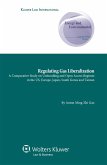This book deals with the problems which occur when one or more parties in a pipeline do not abide by some obligations agreed among them at the beginning of the project. Such problems are most serious when geo-political, legal, or economic developments lead governments to intervene, resulting in the breach of a legitimate expectation of the stakeholders involved. Using regime theory as an analytical tool, the author explores participant behaviour in seven specific case studies that manifest different levels of enforcement to constrain intervention. In the course of the analysis he covers such aspects as the following: the basic principles of freedom of transit, non-interference, non-discrimination, and equal treatment; the government's role as provider of security and stability; crucial importance of government credibility; pipelines as national strategic assets; energy security; land acquisition and appropriate compensation; third party access; transit tariffs and fees; environmental and safety standards; liability; each country's role in safeguarding the pipeline; and the effect of new national oil and gas legislation in any country partner.
Dieser Download kann aus rechtlichen Gründen nur mit Rechnungsadresse in A, B, BG, CY, CZ, D, DK, EW, E, FIN, F, GR, HR, H, IRL, I, LT, L, LR, M, NL, PL, P, R, S, SLO, SK ausgeliefert werden.









